JICA Scholars from Laos Study Legal Sector Development
2023.04.07
JICA has built partnerships with Japanese universities to accept JICA scholars onto their master’s and doctoral courses. The JICA Development Studies Program (JICA-DSP) invites approximately 1,000 scholarship students each year from partner countries to Japan, and offers them the opportunity to learn about Japan's modernization and development experience. These scholars are expected to play a significant role as leaders in their fields after their return, fostering a long-lasting bilateral relationship between each respective country and Japan. In fact, many former participants from the program have already gone on to be active in their home countries in a variety of roles.
Many Laotian law scholars have taken part in the JICA program, including one who is presently a member of the country’s justice ministry, and two who are current participants.
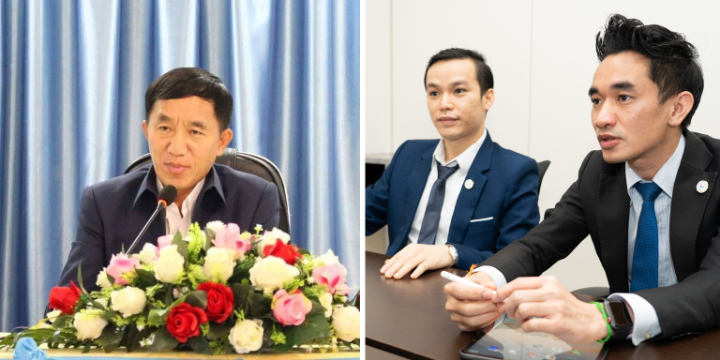
Bountha Songyerthao, Vice Minister of Justice (left photo), and current students Somboon Hosakoun (left of right photo) and Alisaman Phommachan, have taken part in the JICA scholarship program.
Bountha Songyerthao, the Laotian Vice Minister of Justice, first came to Japan as a JICA scholarship student in 2001. “When I was looking for a master's degree abroad, I learned that the Japanese legal system was very well suited to Lao PDR,” he said. “I finally found the right country to go to, I thought, so I applied for the JICA scholarship program.” He spent six months studying Japanese language, history and culture before entering the Nagoya University Graduate School of Law, where he received his master's degree in 2004.
After returning to Laos, he used his knowledge of the lawmaking process in Japan to review and enact legislation as chief of the Criminal Investigation Department, Ministry of Justice. He served as Deputy Chief of the Cabinet, Permanent Secretary to the Minister of Justice, Director General of the Judgment Execution Department, Director General of the Notary Department and Director General of the Department of Personnel, before taking on his present role in 2021. He is directly responsible for overseeing law dissemination, access to justice promotion, economic dispute arbitration and the development of human resources in the judicial field.
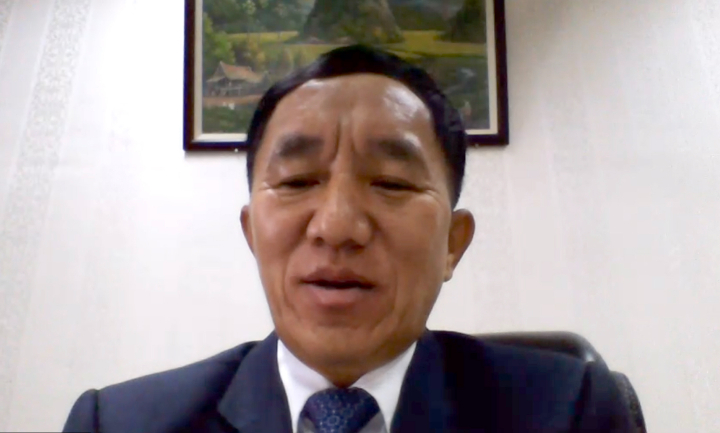
Laos Vice Minister of Justice Bountha Songyerthao. He came to Japan as a JDS Fellow under the Project for Human Resource Development Scholarship (JDS) and studied at the Graduate School of Nagoya University.
Vice Minister Bountha spoke of his appreciation for the Japanese professors and friends who were always on hand to help with his studies and daily life while he was in the program. “I will never forget the time they surprised me with a bouquet of beautiful flowers—even lifting me up in their arms at the completion ceremony for the graduate school,” he said. “I still keep in touch with my friends from that time.”
According to Bountha, there are more than 10 former students now working at the Ministry of Justice in Laos who completed their graduate studies in Japan through the JICA scholarship program. “They all worked hard, and inspired by Japan's legal system, went on to implement legal reforms in Laos, particularly regarding the Civil Code and the Code of Civil Procedure.” Laos is still a developing country in the field of law. Vice Minister Bountha also has high hopes for current and future scholarship students. “I believe it is very beneficial for the development of Laos's legal field that scholarship students continue to go to Japan, absorb knowledge, and then return home,” he said.
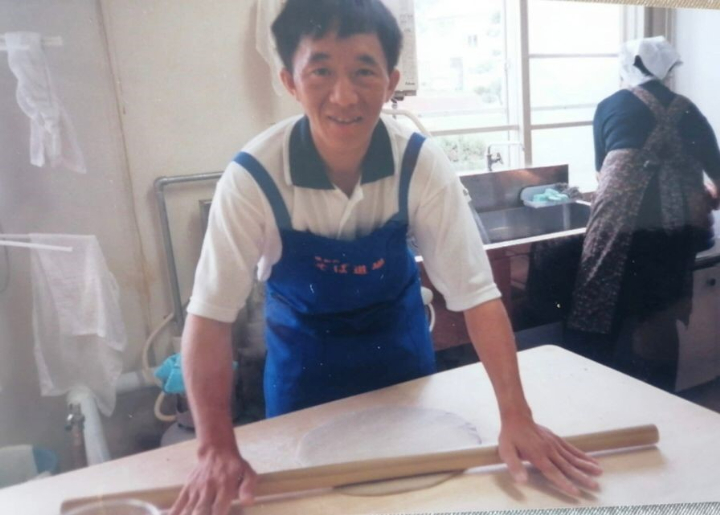
Bountha Songyerthao experienced udon noodle-making In Hokkaido during his time in the JICA scholarship program.
Alisaman Phommachan and Somboon Hosakoun are scholarship students currently studying at Keio University's Graduate School of Law. Both worked as lawyers in Laos before coming to Japan in 2021 through the JICA scholarship program.
"While working in Laos as an attorney, I sometimes provided legal services to Japanese clients and worked with Japanese lawyers,” said Alisaman. “So, I thought that learning about Japanese law and legal affairs would help improve my skills." Somboon dreamed of studying abroad, and through the JICA scholarship program, his dream came true. “All of the senior Laotian lawyers who had studied in Japan are very respectable people,” he said, “and I wanted to be like them.”
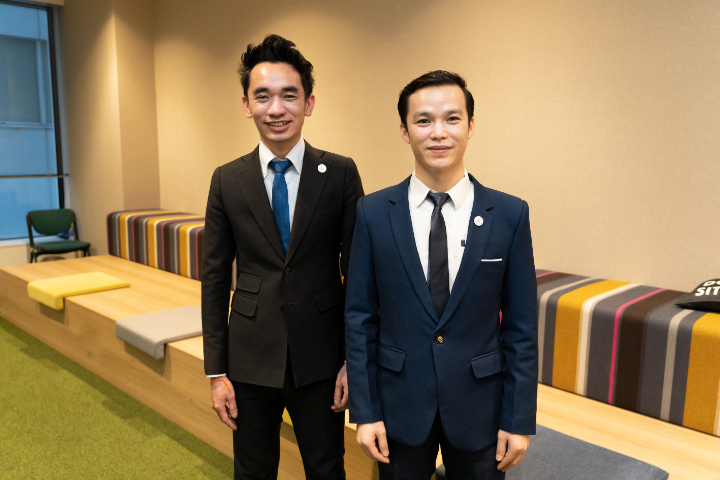
Alisaman Phommachan (left) and Somboon Hosakoun.
Alisaman is interested in how the Japan Federation of Bar Associations (JFBA) operates with independence as an NGO. He is researching the organization’s activities, significance, and relationship with the Ministry of Justice at graduate school. “Unlike the JFBA, the Lao Bar Association (LBA) is under the supervision of the Ministry of Justice, but lawyers (members) are free from any intervention by government authorities, as stipulated under the Lawyer Law,” he said. “I will try my best to contribute to the development of the LBA after returning home, by applying what I learned in Japan."
Somboon is conducting research on the land disputes resolution method in accordance with Lao law. He said he would like to continue his studies until he completes his doctoral program, and he hopes to eventually become a law school professor. “Japan has strict law enforcement, but Laos is still lax,” he said. “We still see many activities that violate the law, such as infringement of the road trafficking act, which causes damage to the lives and property of citizens, as well as problems of noise pollution, tax evasion and so on. And our ultimate goal is to create a legal system to help the poor."
The two men are scheduled to complete their graduate studies in September. As part of the course, they participated in an internship with JICA's law and justice team this February, which also involved an internship at the JFBA and the International Cooperation Agency (ICD). They learned about JICA and ICD's wide-ranging activities, including the support both agencies have given for the development of developing countries’ legal systems. With the support of the JFBA, they observed a trial and exchanged opinions with attorneys belonging to the federation. Both of the graduate students say that they are looking forward to future exchanges with JICA, ICD, and members of the JFBA.
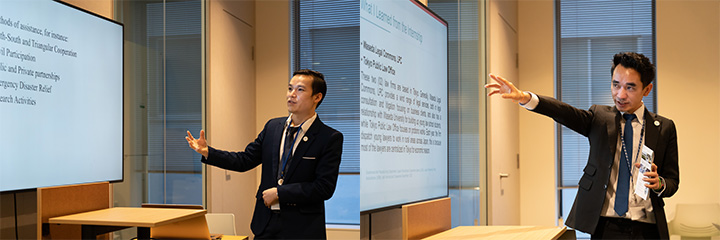
On the last day of their internship at JICA, Somboon (left) and Alisaman gave presentations on what they had achieved through the internship.
The first systematic civil code in the history of Laos was passed in 2018; it went into effect in 2020. Since 1998, JICA has been assisting with the country’s legal development, and has been supporting the drafting of this civil code since 2012.
Professor Matsuo Hiroshi of Keio University Law School is the advisor of the two Laotian students, and has been involved in JICA's law development assistance project in Laos since 2002. “The development of the Laos Civil Code appears to have come to a pause, but I believe that the key to the further development of the country’s legal system lies in the theoretical development of legal interpretation and legislation, and the growth of Lao jurisprudence,” Professor Matsuo said. “This will be achieved through the enactment of special laws such as consumer protection laws and other necessary laws, as well as amendments to basic laws including the Civil Code. I think it is increasingly important to use the JICA scholarship program to cooperate in cultivating human resources in the legal field.”
scroll